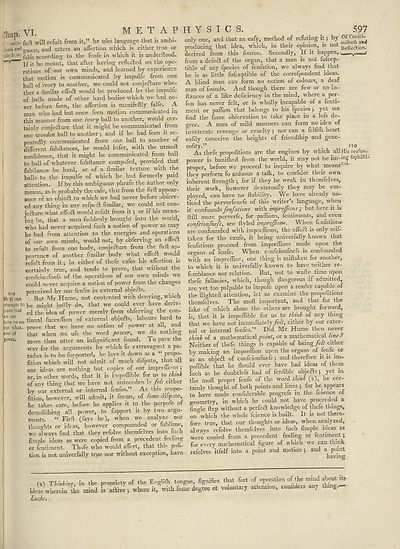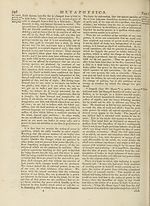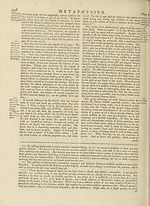Encyclopaedia Britannica, or, a Dictionary of arts, sciences, and miscellaneous literature : enlarged and improved. Illustrated with nearly six hundred engravings > Volume 13, MAT-MIC
(643) Page 597
Download files
Complete book:
Individual page:
Thumbnail gallery: Grid view | List view

'hap- VI. META P
nfci- feft will refult from it,” he ufes language that is ambi-
fnefs and g-uoUs, and utters an aflertion which is either true or
;.leA m faj{-e according to the fenfe in which it is underflood.
If it be meant, that after having reflected on the ope¬
rations of our own minds, and learned by experience
that motion is communicated by impulfe from one
ball of ivory to another, we could not conjedfure whe¬
ther a fimilar effeft would be produced bv the impulfe
of balls made of other hard bodies which we had ne¬
ver before feen, the affertion is manifeflly falfe. ^ A
man who had but once feen motion communicated in
this manner from one ivory ball to another, would cer¬
tainly coniedure that it might be communicated from
one wooden ball to another} and if he had feen it ic-
peatedly communicated from one ball to another of
different fubfiances, he would infer, with the utmoft
confidence, that it might be communicated from ball
to ball of whatever fubflance compofed, provided that
fubflance be hard, or of a fimilar texture with the
balls to the impulfe of which he had formerly paid
attention. If by this ambiguous phrafe the author only
means, as is probably the cafe, that from the firfl appear¬
ance of an objefl to which we had never before obferv-
ed any thing in any refpeft fimilar, we could not con-
jefture what effeiSl would refult from it *, or if his mean¬
ing be, that a man fuddenly brought into the world,
who had never acquired fuch a notion of po-wer as may
be had from attention to the energies and operations
of our own minds, would not, by obferving an effeft
to refult from one body, conjefture from the firfl ap¬
pearance of another fimilar body what effefl would
refult from it •, in either of thefe cafes his affertion is
certainly true, and tends to prove, that without the
confcioufnefs of the operations of our own minds we
could never acquire a notion of power from the changes
I0() perceived bv our fenfes in external objefls.
tor H me But Mr Hume, not contented with denying, winch
[attempt!, to ]ie might juflly do, that we could ever have deriv-
Lrove that e(i the idea of power merely from obferving the con-
tvC™ono- tinual fueceflion of external objeas, labours hard to
what- prove that wre have no notion of power at all, and
that when we ufe the word power, we do nothing
more than utter an infignificant found. To pave the
wav for the arguments by which fo extravagant a pa¬
radox is to be fupported, he lays it down as a “ propo-
fition which will not admit of much difpute, that all
our ideas are nothing but copies of our impreffions ',
or, in other words, that it is impoflible for us to think
of any thing that we have not anteceden ly felt either
by our external or internal fenfes.” As this jwopo-
fition, however, will admit, it feems, of Come difpute,
he takes care, before he applies it to the purpofe of
demolifhing all power, to fupport it by two argu¬
ments. “ Firfl (fays he), when we analyze our
thoughts or ideas, however compounded or. fublime,
we always find that they refolve themfelves into fut h
fixnple ideas as were copied from a precedent feeling
or fentiment. Thole who would aflert, that this poli-
tion is not univerfally true nor without exception, have
ver of
>ower#
H Y S I C S. 597
only one, and that an eafy, method of refuting it; by
producing that idea, which, in their opinion, is not Reflecq.ion.
derived from this fource. Secondly, If it happen,
from a deleft of the organ, that a man is not fufcep-
tible of any fpecies of fenfation, we always find that
he is as little fufceptible of the correfpondent ideas.
A blind man can form no notion of colours, a deaf
man of founds. And though there are few or no in-
llances of a like deficiency in the mind, where a per-
fon has never felt, or is wholly incapable of a fenti¬
ment or paflion that belongs to his fpecies ; yet ive
find the fame obfervation to take place in a lefs de¬
gree. A man of mild manners can form no idea of
inveterate revenge or cruelty 5 nor can a felfiili heart
eafily conceive the heights of friendlhip and gene-
rofity.” . no
As thefe propofitions are the engines by which all His reafon-
power is banilhed from the world, it may not be im-fophifu-
proper, before we proceed to inquire by what .meansca ‘
they perform fo arduous a talk, to confider their own
inherent llrength ; for if they be weak in themfelves,
their work, however dexteroully they may be em¬
ployed, can have no liability. We have already no¬
ticed the perverfenefs of this writer’s language, when
it confounds fenfations with impreffions ; but here it is
Hill more perverfe, for paflions, lentiments, and even
confcioufnefs, are llyled imprefjiom. When fenfations
are confounded with impreffions, the effeft is only mif-
taken for the caufe, it being univerfally known that
fenfations proceed from impreffions made upon the
organs of fenfe. When confcioufnefs is confounded
with an impreflion, one thing is millaken for another,
to which it is univerfally known to have neither re-
femblance nor relation. But, not to walle time upon
thefe fallacies, which, though dangerous if admitted,
are yet too palpable to impole upon a reader capable of
the flighted: attention, let us examine the propofitions
themfelves. The moll important, and that for the
fake of which alone the others are brought forward,
is, that it is impoflible for us to think of any thing
that we have not immediately felt, either by our exter¬
nal or internal fenfes.” Did Mr Hume then never
think of a mathematical point, or a mathematical line ?
Neither of thefe things is capable of beingeither
by making an impreflion upon the organs of fenfe. or
as an objeft of confcioufnefs and therefore it is im¬
poflible that he fhould ever have had ideas of them
fuch as he doubtlefs had of fenfible objefts 5 yet in
the moft proper fenfe of the word think (s), he cer-
tainly thought of both points and lines \ for he. appears
to have made confiderable progrefs in the fcience of
geometry, in which he could not have proceeded a
Angle Hep without a perfect knowledge of thefe things,
on which the whole fcience is built. It is not there¬
fore true, that our thoughts or ideas, when analyzed,
always refolve themfelves into fuch fimple ideas as
were copied from a precedent feeling or fentiment ,
for every mathematical figure of which we can think
refolves itfelf into a point and motion ; and a point
having
(V, in the propriety of the EnglifH tongue, (ignifies that fort of operation of the mind about its
ideas wherein the mind is 'active ; where it, with fome degree ol voluntary attention, conliders any ling.
Locke,
nfci- feft will refult from it,” he ufes language that is ambi-
fnefs and g-uoUs, and utters an aflertion which is either true or
;.leA m faj{-e according to the fenfe in which it is underflood.
If it be meant, that after having reflected on the ope¬
rations of our own minds, and learned by experience
that motion is communicated by impulfe from one
ball of ivory to another, we could not conjedfure whe¬
ther a fimilar effeft would be produced bv the impulfe
of balls made of other hard bodies which we had ne¬
ver before feen, the affertion is manifeflly falfe. ^ A
man who had but once feen motion communicated in
this manner from one ivory ball to another, would cer¬
tainly coniedure that it might be communicated from
one wooden ball to another} and if he had feen it ic-
peatedly communicated from one ball to another of
different fubfiances, he would infer, with the utmoft
confidence, that it might be communicated from ball
to ball of whatever fubflance compofed, provided that
fubflance be hard, or of a fimilar texture with the
balls to the impulfe of which he had formerly paid
attention. If by this ambiguous phrafe the author only
means, as is probably the cafe, that from the firfl appear¬
ance of an objefl to which we had never before obferv-
ed any thing in any refpeft fimilar, we could not con-
jefture what effeiSl would refult from it *, or if his mean¬
ing be, that a man fuddenly brought into the world,
who had never acquired fuch a notion of po-wer as may
be had from attention to the energies and operations
of our own minds, would not, by obferving an effeft
to refult from one body, conjefture from the firfl ap¬
pearance of another fimilar body what effefl would
refult from it •, in either of thefe cafes his affertion is
certainly true, and tends to prove, that without the
confcioufnefs of the operations of our own minds we
could never acquire a notion of power from the changes
I0() perceived bv our fenfes in external objefls.
tor H me But Mr Hume, not contented with denying, winch
[attempt!, to ]ie might juflly do, that we could ever have deriv-
Lrove that e(i the idea of power merely from obferving the con-
tvC™ono- tinual fueceflion of external objeas, labours hard to
what- prove that wre have no notion of power at all, and
that when we ufe the word power, we do nothing
more than utter an infignificant found. To pave the
wav for the arguments by which fo extravagant a pa¬
radox is to be fupported, he lays it down as a “ propo-
fition which will not admit of much difpute, that all
our ideas are nothing but copies of our impreffions ',
or, in other words, that it is impoflible for us to think
of any thing that we have not anteceden ly felt either
by our external or internal fenfes.” As this jwopo-
fition, however, will admit, it feems, of Come difpute,
he takes care, before he applies it to the purpofe of
demolifhing all power, to fupport it by two argu¬
ments. “ Firfl (fays he), when we analyze our
thoughts or ideas, however compounded or. fublime,
we always find that they refolve themfelves into fut h
fixnple ideas as were copied from a precedent feeling
or fentiment. Thole who would aflert, that this poli-
tion is not univerfally true nor without exception, have
ver of
>ower#
H Y S I C S. 597
only one, and that an eafy, method of refuting it; by
producing that idea, which, in their opinion, is not Reflecq.ion.
derived from this fource. Secondly, If it happen,
from a deleft of the organ, that a man is not fufcep-
tible of any fpecies of fenfation, we always find that
he is as little fufceptible of the correfpondent ideas.
A blind man can form no notion of colours, a deaf
man of founds. And though there are few or no in-
llances of a like deficiency in the mind, where a per-
fon has never felt, or is wholly incapable of a fenti¬
ment or paflion that belongs to his fpecies ; yet ive
find the fame obfervation to take place in a lefs de¬
gree. A man of mild manners can form no idea of
inveterate revenge or cruelty 5 nor can a felfiili heart
eafily conceive the heights of friendlhip and gene-
rofity.” . no
As thefe propofitions are the engines by which all His reafon-
power is banilhed from the world, it may not be im-fophifu-
proper, before we proceed to inquire by what .meansca ‘
they perform fo arduous a talk, to confider their own
inherent llrength ; for if they be weak in themfelves,
their work, however dexteroully they may be em¬
ployed, can have no liability. We have already no¬
ticed the perverfenefs of this writer’s language, when
it confounds fenfations with impreffions ; but here it is
Hill more perverfe, for paflions, lentiments, and even
confcioufnefs, are llyled imprefjiom. When fenfations
are confounded with impreffions, the effeft is only mif-
taken for the caufe, it being univerfally known that
fenfations proceed from impreffions made upon the
organs of fenfe. When confcioufnefs is confounded
with an impreflion, one thing is millaken for another,
to which it is univerfally known to have neither re-
femblance nor relation. But, not to walle time upon
thefe fallacies, which, though dangerous if admitted,
are yet too palpable to impole upon a reader capable of
the flighted: attention, let us examine the propofitions
themfelves. The moll important, and that for the
fake of which alone the others are brought forward,
is, that it is impoflible for us to think of any thing
that we have not immediately felt, either by our exter¬
nal or internal fenfes.” Did Mr Hume then never
think of a mathematical point, or a mathematical line ?
Neither of thefe things is capable of beingeither
by making an impreflion upon the organs of fenfe. or
as an objeft of confcioufnefs and therefore it is im¬
poflible that he fhould ever have had ideas of them
fuch as he doubtlefs had of fenfible objefts 5 yet in
the moft proper fenfe of the word think (s), he cer-
tainly thought of both points and lines \ for he. appears
to have made confiderable progrefs in the fcience of
geometry, in which he could not have proceeded a
Angle Hep without a perfect knowledge of thefe things,
on which the whole fcience is built. It is not there¬
fore true, that our thoughts or ideas, when analyzed,
always refolve themfelves into fuch fimple ideas as
were copied from a precedent feeling or fentiment ,
for every mathematical figure of which we can think
refolves itfelf into a point and motion ; and a point
having
(V, in the propriety of the EnglifH tongue, (ignifies that fort of operation of the mind about its
ideas wherein the mind is 'active ; where it, with fome degree ol voluntary attention, conliders any ling.
Locke,
Set display mode to:
![]() Universal Viewer |
Universal Viewer | ![]() Mirador |
Large image | Transcription
Mirador |
Large image | Transcription
Images and transcriptions on this page, including medium image downloads, may be used under the Creative Commons Attribution 4.0 International Licence unless otherwise stated. ![]()
| Permanent URL | https://digital.nls.uk/192692404 |
|---|
| Attribution and copyright: |
|
|---|
| Description | Ten editions of 'Encyclopaedia Britannica', issued from 1768-1903, in 231 volumes. Originally issued in 100 weekly parts (3 volumes) between 1768 and 1771 by publishers: Colin Macfarquhar and Andrew Bell (Edinburgh); editor: William Smellie: engraver: Andrew Bell. Expanded editions in the 19th century featured more volumes and contributions from leading experts in their fields. Managed and published in Edinburgh up to the 9th edition (25 volumes, from 1875-1889); the 10th edition (1902-1903) re-issued the 9th edition, with 11 supplementary volumes. |
|---|---|
| Additional NLS resources: |
|

